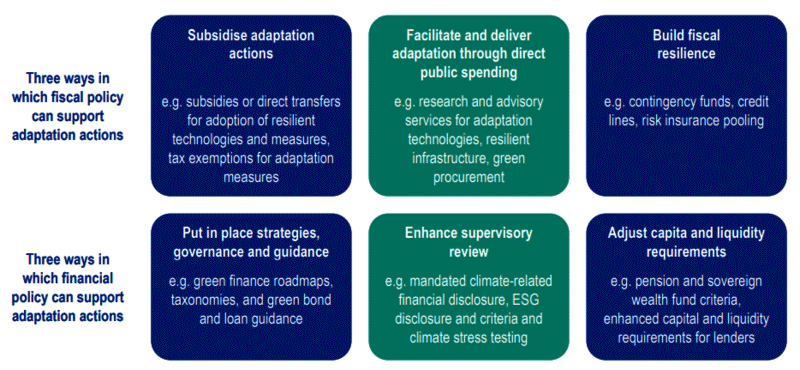The countries of Africa, the Caribbean and the Pacific (ACP) have identified adaptation actions to be a priority in water and wastewater management, agriculture, forestry and land use, disaster risk management and coastal protection. The investment costs of adaptation are high, however. The commitment from developed countries to provide climate finance in ACP countries remains strong, yet no single finance source will be sufficient to meet the needs for financing climate action. Government actors, with a strong influence on the complex system of financial flows, can make use of a number of policy levers that can directly and indirectly change the allocation of capital and could be more meaningfully pulled to influence climate action.
Using fiscal policies to support adaptation actions and resilience to the adverse impacts of climate change is a nascent area. Changing prices for consumers and investors through fiscal policy, however, has long been used to steer behaviours towards certain policy objectives. This paper identifies three ways in which fiscal policies can be applied to influence private investment in adaptation, to increase the supply of goods and services for adaptation, as well as to see fiscal resilience that allows an economy to continue functioning in the event of a climate-related shock.
The role of financial policy in addressing climate change risks is growing. It can regulate and supervise the financial sector to better ensure climate risks are reflected in investment decisions across many levels and scales, avoiding their build up in the financial system. This paper identifies three ways in which policymakers can encourage central banks and other regulators to take action that increases investment in adaptation and climate resilience, as well as reduces spending that is not climate resilient or that is mal-adaptive.
Mitigation remains core to climate action, as does finance for mitigation. Reductions in emissions can reduce the adverse impacts of climate change and therefore some adaptation needs. Yet, even with ambitious mitigation, adaptation to a changing climate will be needed: we are already locked into climate change and adaptation needs will not be removed.
Not all adaptation outcomes are necessarily linked to financial incentives from government actors. Wider policy changes will be critical and build on existing climate and development policies. The Paris Agreement seeks to make finance flows consistent with low-emission, climate-resilient development pathways. Coupled with the need for countries to start to implement and, therefore, finance their Nationally Determined Contributions for mitigation as well as National Adaptation Plans, more conversations are needed on how finance can better facilitate climate change adaptation towards more climate resilient households, corporations and economies.









